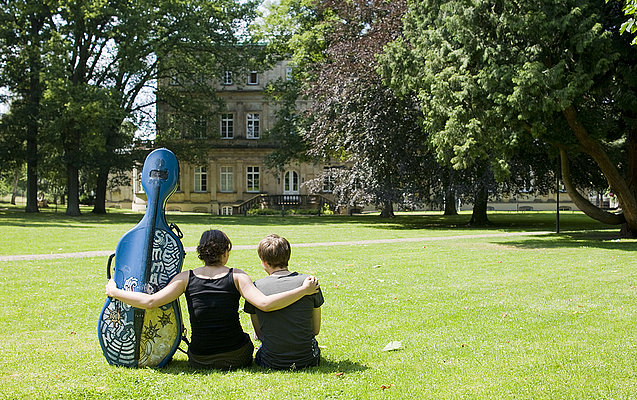University

HfM Detmold is a highly diverse university. The artistic promotion of excellent young musicians is closely linked to the promotion of the broad public. Both areas are mutually dependent.
Within the range of courses offered, students and teachers of many nationalities are therefore involved in the practice, teaching, mediation, transmission and scientific analysis of music. The main focus is on the artistic subjects. Here the university devotes particular attention to the instruments of the classical symphony orchestra as well as the piano, the organ and opera and lieder singing from historically informed performance to contemporary music. Additional instruments taught are the accordion, guitar, recorder and saxophone. Great importance is attached to chamber music, which already plays a role in the training of young musicians at the Detmold Young Students’ Institute or in the scholarships of the Detmold Summer Academy. The tonmeisters of the Erich Thienhaus Institute capture the artistic work. Whether CD, live stream or audio file – artistic criteria play a decisive role in the transmission of music.
In the public cultural life, students, teachers and top-class guests underline the importance of HfM Detmold as a regional purveyor of culture in over 400 events. The central venue is the Konzerthaus, which has 600 seats and features excellent acoustics as well as an integrated wave field synthesis system. Numerous local sponsors as well as the Hochschule für Musik Detmold Foundation provide the ideal breeding ground for supporting this work.
The pedagogical courses and offerings are dedicated to a broad understanding of music – whether in the field of elementary music education, combined with the opportunity to gain practical insight into early childhood education at the music nursery of the university, within the dense network of partner schools for teacher training or in developing the ability to give instrumental lessons for learners of all ages. Last but not least, students of the Music Outreach Master’s course provide answers as to how music can best reach the audience.
The practice of music is supported by the findings of the scientific subjects. In this field, the university cooperates with different partners such as OWL University of Applied Sciences and Arts and the University of Paderborn. The Musicology Seminar Detmold/Paderborn with its Centre for Music – Edition – Media is a joint institution which specialises, for example, in digital sheet music for orchestras. In cooperation with OWL University of Applied Sciences and Arts, the Centre for Music and Film Informatics explores the relationship between humans and computers. The music acoustics research department focuses on the optimisation of room acoustics. The network of universities of music analyses current trends in quality management and teaching and the Institute for Lifelong Learning in Music (L³Musik) combines findings on music-making over the course of a lifetime with aspects of further education and music-making practice.























